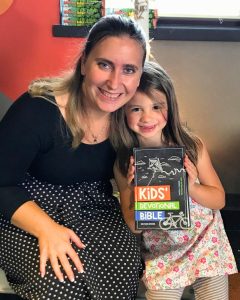Jessica Springer recently joined the Serve Locally team as the new director of children and family ministries for the Evangelical Covenant Church, bringing over two decades of pastoral experience. She sat down virtually with The Covenant Companion to discuss her call to ministry, her journey to the Covenant, and her vision for her role. This conversation has been edited for length and clarity.
How did you first connect to the Covenant?
I got connected in an indirect way. I was a children’s pastor in Bentonville, Arkansas, and our church was thriving. It had grown to be over two-thirds children and family in three years. I was pregnant with my third child, spending Christmas in Kansas City with my family of origin, when a friend of the family said, “Hey, I have somebody I want you to have coffee with. They’re in the Covenant, and they’re looking for a children’s pastor.”

The day I was leaving to go back to Bentonville, I had coffee with that Covenant pastor, Johan Tredoux. He taught at Mid-America Nazarene University with my friend Mark Hayes. I told Johan I really loved where I was, and we were Nazarene, so why would I even consider moving? But I said I would pray over it. I started praying, and through the next two or three months, I sensed this draw to move back to Kansas. The church was five minutes away from my parents’ home, so it was a great opportunity.
That was Community Covenant in Lenexa, Kansas, right?
Yes, I started in May 2013. But it wasn’t until the spring of 2015 that I started the process of transferring my ordination. I came into the Covenant because of proximity and really liking the pastor, but within the next year or so, after going to Midwinter and different events, I fell in love with the Covenant.
Tell us about your initial call to ministry.
My first exposure to children’s ministry was in my junior year of college. I took a nanny job for three kids and started working with our church’s children’s pastor. That’s when God really began to speak to me about serving in ministry.
I fought and resisted it. I didn’t feel like I had the theological framework or qualifications. I thought I was going to be doing design and production for theater. I continued to resist in different seasons, thinking I was just going to help serve children, and then it moved to children and family, then discipleship, and then teaching. So that call evolved as God kept opening new doors, and I was just being willing to say yes to God’s shaping.
How did you come to your current role on the denominational team?
I started sensing that God was calling me to something different a few years ago. I was serving as an associate pastor at Community Covenant. As I was wrestling, I heard God say, “You have a voice and you’re not using your voice. And you’re not living into your full potential.” Having met with a spiritual director for years, I took some time to discern and process what that meant.
Then, at Midwinter 2023, I experienced a vision from God. I was flying, and it was a really dark, gray, cloudy day. Finally, we got above the clouds and the sun began to rise. I started to see this rainbow effect, and I just couldn’t stop praising God. I distinctly heard God say, “You have been trapped, and you no longer have to be trapped anymore. It’s time for you to move out of the gray.” Eventually, I realized that it was time to leave Community, which was sad because I loved that church.
I thought I was going to do integrative family church planting, and in the process, I would get a job and do bivocational ministry. I had been working at a nonprofit where I could work remotely and have the space to start creating an entrepreneurial ministry on the side. But I realized that I’m not hardwired for bivocational ministry. When you’re not living into your calling and gifting, you’re depleted.
Then, during this process, my old seminary professor, Dean Blevins, who didn’t even know my journey at this time, recommended me to be an adjunct professor at Mid-America Nazarene University to teach Christian education for children and families. Teaching that class reawakened something in my heart that had always been there: how integrated everything is in children’s and family ministry, how it holistically engages the church and nurtures the whole system. It renewed some passions and allowed me to have that voice to speak into things that I’ve had for a long time. I knew I was going to be moving back into some sort of children’s and family systems. That’s when I discovered the job description on the denominational website and started the application process.
What is your vision for this work? What are you excited about?
I’m looking forward to creating intersections and integrations between all of our different ministries and creating stronger collaborations. All of life is sacred, so it’s about helping families and churches rediscover that. I think many families have lost that art—they’ve compartmentalized what is sacred and what is ordinary.
To grow in seeing the sacred in daily life, we have to rebuild our ability to name moments. I often think of it like the “hidden Mickeys” at Disney World—little symbols intentionally placed in plain sight that most people miss. God’s presence is often like that: visible but unnoticed. Discipleship, then, includes learning to see and name those moments of grace together. That requires mentors, spiritual leaders, and intergenerational communities who can help us develop that awareness through both formal and informal pathways.
Formally, churches can create rhythms and practices that draw attention to God’s work—spiritual formation exercises, response stations, storytelling moments—but it’s the relational, organic work that ultimately transforms us. That’s the slower, messier, but more lasting kind of growth.
Any final words?
It’s an exciting time. I’ve had some initial conversations with the interim team. They did a phenomenal job, and now it’s a rebuilding time. I want to encourage people to know that there’s a lot of listening in the denomination, that they’re hearing, and that we’re going to really work together. This is important; this is a value, and we’re going to look at how we engage the next generation not just to know Christ, but to grow deeper and become like Jesus in all they do.
I don’t think this shift happens overnight. Formation takes time. But we know we’re moving in the right direction when we see more intentionality in how churches invest in children and families—not just through curriculum, but through nurturing physical, emotional, and spiritual growth. When kids feel empowered in their churches, when families create rhythms that help them bless others, when faith conversations happen naturally, and when spiritual practices become a natural response—those will be signs we’re moving from maintenance to formation.
If I could speak directly to pastors, parents, and kids, I’d simply say: come and experience a deeper wholeness, a deeper shalom. You don’t have to add more to your plate. Let’s journey together and discover what it means to follow Jesus right where you are and then move deeper into practices that embody his ways. Jesus said, “My yoke is easy and my burden is light.” He was offering people a new way to live—less about rules and more about love embodied. That’s the same invitation for formational children’s and family ministries: come and find rest, a deeper wholeness, and shalom as you move deeper into discipleship.
Learn how renewal is taking root across the Covenant—and find your next faithful step—at covchurch.org/renewal.














